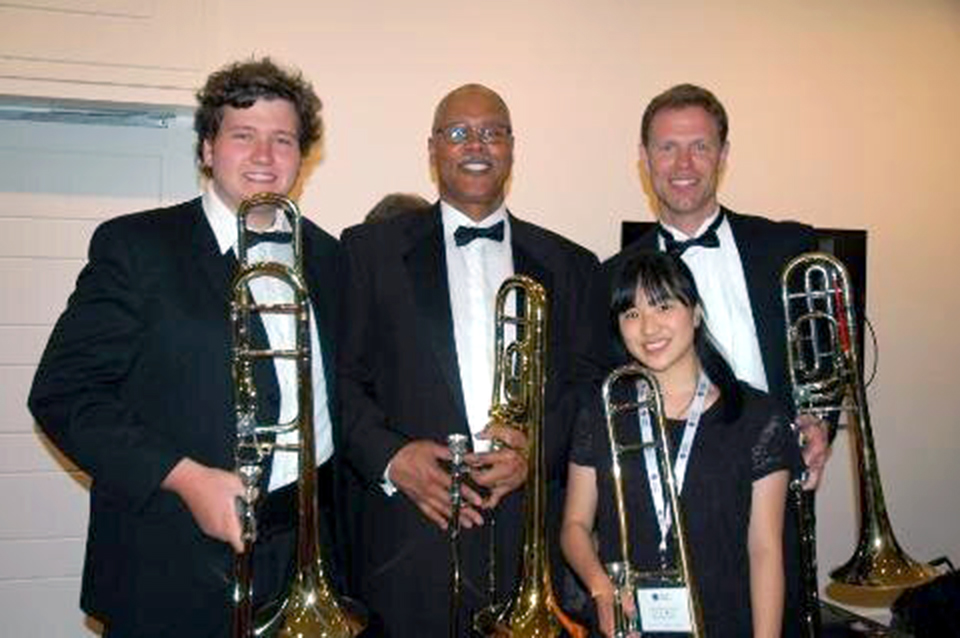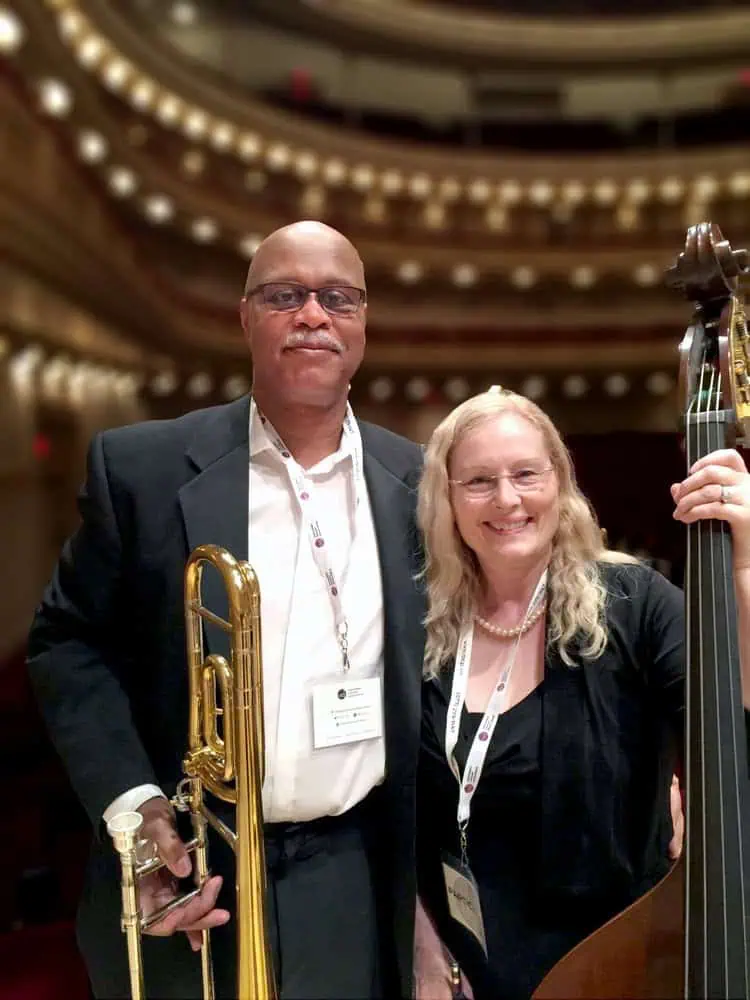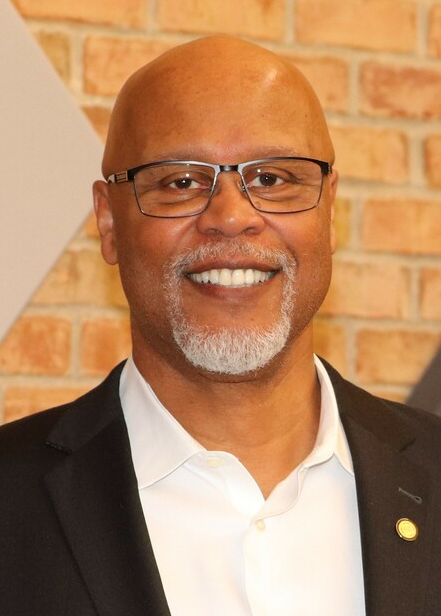
EAB Thought Leadership
Forging Leadership Through Music:
The Symphony of Resilience
By Dale Nesbary, Ph.D., CampusWorks Executive Advisory Board Member
Former President, Muskegon Community College (2009-2022)
As we navigate the post-Covid-19 landscape, with its diminishing federal support and looming political and economic challenges, the essence of leadership in higher education has never been more critical. My unique journey to academic leadership—transitioning from a 16-year career in finance and criminal justice into academia—has been significantly shaped by an unconventional mentor: my career as a professional musician. Unlike conventional leadership narratives, my story intertwines with lessons learned from music, offering a distinctive perspective on leading through harmony and resilience.

Over the years, leadership and governance author Jim Collins has inspired my understanding of what it means to be a great leader. I often come back to the concept of Level 5 leadership from his best-selling book Good to Great. According to Collins, great leaders display a powerful mixture of personal humility and indomitable will. The five Level 5 characteristics include:
- A personal sense of humility.
- A deep personal understanding of one’s strengths and weaknesses.
- A laser-like focus on the organization’s purpose.
- A passionate commitment to continuous learning.
- A relentless determination to do what is right, not what is easy.
As we discuss each one, I’ll share some of the lessons I learned from music and how they made me a better leader, offering you insights to discover and refine your own approach.
1. The Rhythm of Humility
My ambition to perform alongside top music professionals led me to invaluable lessons in humility. Notably, Professor Burgess Gardner, who mentored me at Michigan State University, instilled in me the importance of relentless preparation, warning me that the music industry is unforgiving and competitive. A memorable moment playing a contract gig with The Temptations, where a single off-note nearly cost me my position, taught me the critical importance of preparation and humility—lessons that directly translate to the leadership in higher education, where every member, regardless of their role, deserves respect and consideration.
During my time as president of Muskegon Community College in Muskegon, Michigan, I intentionally demonstrated the value of inclusivity and collaboration through regular meetings with both on-campus and off-campus leaders, regardless of their official status or rank. One notable example is Ed Simmons, a now-retired friend from high school and former president of our custodial maintenance union. Our meetings served as a powerful example, challenging conventional perceptions of importance and hierarchy within the college community. Observers often expressed surprise at seeing the college president engage in discussions with someone they perceived as “just a janitor.” This dynamic offered a unique opportunity to dispel the outdated notion that rank dictates privilege or worth. Over time, this approach not only fostered a deeper sense of community and respect across all levels of the institution but also humorously highlighted the absurdity of rigid hierarchical thinking. Together, Ed and I showcased the transformative power of recognizing and valuing leadership in all its forms, benefiting the entire college community by promoting a culture of equality and mutual respect.
2. An Ensemble of Strengths and Weaknesses
Every leader in higher education will encounter their pivotal “Temptations” moment, where the outcome hinges on their preparation. This preparation spans from academia, including undergraduate and graduate studies, to practical experiences in classrooms and administrative roles. Standing before colleagues, regional chambers of commerce, or university boards, the depth of one’s experience is as crucial to success as my meticulous preparation for performing with The Temptations.
I often reflect that the most intense pressure I faced wasn’t during interviews for high-ranking academic positions, but in moments requiring flawless musical performance. Similarly, presenting a proposal for a $5 million grant to a state’s economic development corporation demands not just equivalent preparation but an understanding of the high stakes involved. In the world of music, replacement is just a step away for those unprepared; in academia, missed opportunities for significant funding can impede an institution’s progress. Success in these endeavors requires not only thorough preparation but also humility and collaboration.
When arriving at Muskegon Community College in 2009, I set a goal publicly for the institution to be the best community college in the state. This was a lofty goal, but in the minds of our campus community an achievable one. Together with my colleagues, we initiated relationships with Michigan’s governor, granting agencies, and donors at a time when the norm was to patiently await one’s turn in the appropriations process. This proactive approach was designed to overcome the limitations that hindered our students’ access to necessary financial and programmatic resources required for success.
By developing a strategic plan comprising members of our board, students, employees, and broader community, we forged a blueprint for how best to advance our institution, resulting in an unprecedented era of fundraising success and student success achievement. For the first time in the college’s history, we were named by bestcolleges.com (2017) and intelligent.com (2021) as the best community college in Michigan and among the top 30 overall among community colleges nationally, each based upon commonly used student and institutional success metrics. Moreover, we were named an Achieving the Dream (AtD) Leader College in 2015, a distinction the college still maintains.
Jim Collins states that success at an institution needs to be “built to last.” Our repeated rankings among the best in Michigan and our continued AtD Leader College status indicates that our plan for success was indeed built to last.
3. Conducting with Focus

Dale and the trombone section backstage at Carnegie Hall for the 2016 West Michigan Concert Winds performance.
Malcolm Gladwell’s theory—that mastering a discipline requires over 10,000 hours of practice—resonated with my musical journey. I continued to invest time in practicing multiple instruments, performing with orchestras and bands, and studying music theory before my college years. This effort led to an invitation from Dr. Leonard Falcone, a renowned low brass professor at Michigan State University (MSU), to join as a music major, a significant honor considering my role as the principal trombonist in the Michigan Youth Arts Festival Band. This invitation was also paired with a Creative Arts Scholarship, granted for a composition I wrote for a 17-piece ensemble.
My dedication paid off at MSU, where I was one of 60 trombonists, ranging from beginners to seasoned graduate students, like my instructor, Dr. Ed Huttlin. The experience underscored the importance of preparation and humility. My journey through music, from playing in small jazz ensembles to large symphony orchestras, honed my abilities to listen, collaborate, lead, and follow effectively.
Pursuing a career in academia—whether as a faculty member, dean, or president—similarly demands years of diligent effort and collaboration with a diverse array of partners, including students, staff, and various community and institutional stakeholders. Setting clear goals and persistently working towards them has been crucial to my success. Not surprisingly, strategic planning has been a key tool in navigating my institutions toward their objectives, demonstrating the universal value of hard work and strategic vision in achieving professional excellence.
4. Honing Your Craft
Professional development is a fundamental aspect of higher education and has been crucial throughout my varied career. Initially aspiring to be a professional musician, I achieved this goal early but didn’t stop there. My career path then spanned public budgeting and finance, policing, public policy, and eventually leadership and governance. My academic journey, from undergraduate to doctoral studies, equipped me with the necessary knowledge for each transition, particularly in areas of fiscal management, policing research, and leadership principles.
The discipline and collaborative skills honed through years of musical training have been invaluable, not only in maintaining my musical proficiency but also in adapting to new professional environments. These skills facilitated a seamless integration into professional development opportunities across different fields. The practice of continually upgrading my skills became second nature, eliminating any resistance to diving into professional development in each new domain I entered. This approach has underscored the importance of lifelong learning and adaptability, principles that have been essential to my success across the spectrum of my career.
5. The Crescendo of Integrity
Long before psychologists Drs. David Dunning and Justin Kruger identified the Dunning-Kruger effect—the phenomenon where individuals with limited knowledge overestimate their abilities—my parents, Sadie May (Woolwine) Nesbary and Admiral Dural Nesbary, understood its essence. They observed that we often encounter individuals whose confidence, borne out of ignorance and a lack of effort, exceeds their competence. My parents emphasized the value of hard and intelligent work as the key to staying competitive and avoiding the pitfalls of unearned self-assurance.
They were adamant about the importance of completing what we start, striving for excellence, and working with unmatched diligence. This ethos led all my siblings to pursue higher education, achieving qualifications that span from community college certificates to a Ph.D. These achievements were not the result of an easy path but were essential milestones in realizing our personal ambitions, underlining the importance of perseverance and dedication in the face of challenges.
Directing the children to select an instrument(s) or choose an art was a wise decision by our parents. Much like in the case of belonging to an ensemble, we found that while we may not have always been treated equitably, we did understand our relative strengths and adjusted accordingly. For me personally, professional life and life in the academy is not always fair. However, I was gratified that my efforts put me in a place in which I had an opportunity to succeed.
Our response to the Covid-19 pandemic is an example of doing what is right, not what is easy. In March of 2020, Muskegon Community College, like many others, shifted to a fully remote course delivery format. Many in the community felt this was not the appropriate direction for the college. Nonetheless, for the safety and security of our campus community, we did. Fast forward 6 months to the Fall semester of 2020, the College remained mostly remote with some individuals who initially protested the decision demanding to be remote-only for their own safety.
Orchestrating Success
Antoine de Saint-Exupéry’s oft quoted phrase from his novella Le Petit Prince, “a goal without a plan is just a wish,” is more than simply a feel-good phrase. For those in higher education, the journey to effective leadership, much like mastering a musical instrument, is a combination of experiences, lessons, and unwavering dedication to a goal, clearly articulated and diligently approached. It’s about creating a space where diverse talents can come together to orchestrate success, guided by the principles of humility, focus, continuous improvement, and integrity. Whether it be setting a goal to become the most talented musician or the most accomplished institution of higher education in a particular category, the principles are consistent. Looking forward, let us strive to lead with resilience, innovation, and inclusive excellence, ensuring our institutions not only survive but thrive in the face of adversity.


Dale K. Nesbary, Ph.D.
Dale K. Nesbary, Ph.D. served as President of Muskegon Community College from 2009-2022 during which time the college was named best community college in Michigan in 2017 and 2021 by BestColleges.com and Intellegent.com respectively, employing standard success metrics. The College featured perennially nationally ranked RN and LPN nursing programs, and two performance groups (West Michigan Concert Winds and the MCC Collegiate Singers) having performed in the Isaac Stern Auditorium of New York’s famed Carnegie Hall.
Prior to MCC, he served as Vice President and Dean for Academic Affairs and Full Professor of Political Science at Adrian College and as Associate Professor and Director of the Master of Public Administration Program at Oakland University. He also served as Research Director and Technical Services Director with the Boston Police Department as well as in leadership positions with City of Boston central administration. He also held analytic positions with the National Conference of State Legislatures in Denver, Colorado, and the Michigan Senate Fiscal Agency. During his professional career, he personally led multiple strategic planning processes, technology process redesign initiatives, and governance transitions.
He has presented on hundreds of occasions to academic, leadership, governance, legislative, and executive branch institutions and published three books and over 30 academic/refereed papers primarily in the areas of finance, technology, and policing. He earned a Ph.D. in Law, Policy and Society from Northeastern University, a Master of Public Administration degree from Western Michigan University and a Bachelor of Arts degree from Michigan State University.
In addition to the CampusWorks Executive Advisory Board, he continues to chair the Trinity Health System Michigan Board and previously served on the Center for Community College Student Engagement (CCCSE) National Board, the American Association of Community Colleges (AACC) Workforce Development Commission, and the American Council of Education (ACE) Fellows Executive Board among others. He remains a silver life member of the NAACP.
He resides in Newburg, MD with his beautiful wife of 43 years, Connie and is the proud father of two adult children, Nicole, and Matthew. His interests include baking bread, crafting jams, and gigging with any group needing a trombonist.

